Ladies with lures: Part two
Women may not be as prolific as the men on the professional fishing circuit just yet, but don’t tell them they don’t have what it takes to compete
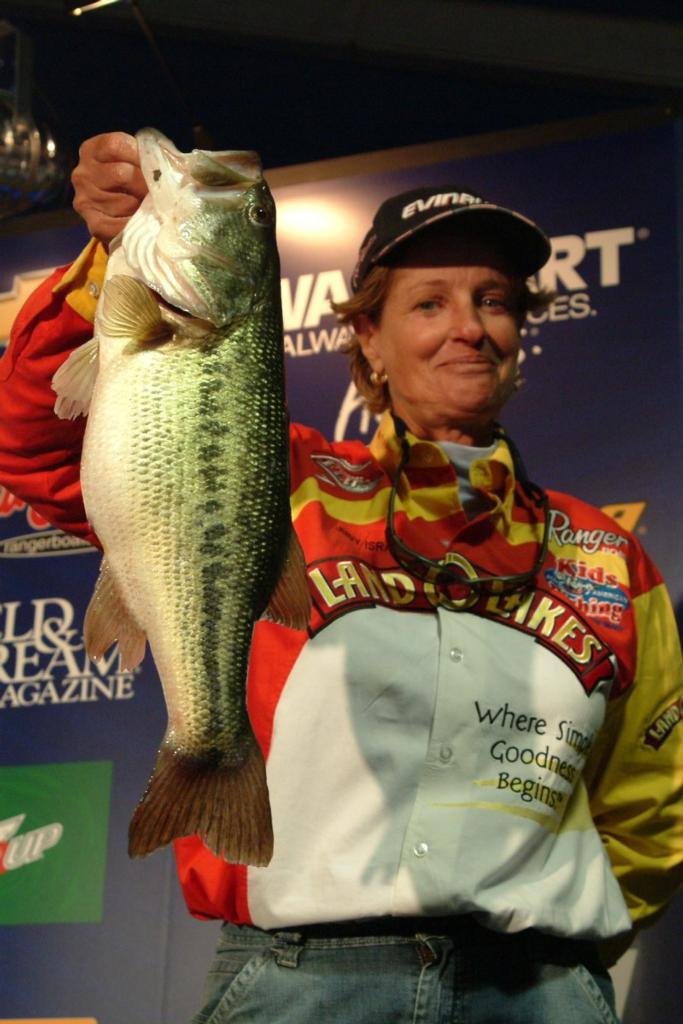
Editor’s Note: This is the second half of a two-part feature article focusing on the state of women in professional fishing today. The first part was posted Sept. 2.
————————————————
Judy Israel: “It was in my bones, and you couldn’t stop me”
Like Mary Divincenti, Judy Israel also grew up sans bass fishing. But unlike Divincenti, who lives in the bass-rich Southeast, Israel had quite an interesting geographic constraint – she’s from the Bronx.
“Being from the Bronx in New York, I’d never heard of a bass,” Israel said. “As a little girl, I did go fishing with my dad, but we used to go for flounder, and we didn’t cast – we just dropped it straight down. I never knew that such great things existed.”
Israel’s introduction to bass fishing came a bit later in life, when she was in her late 40s to early 50s. Her husband, Abbie, who also competes as a co-angler on the Wal-Mart FLW Tour, was on a business trip in southern Florida when somebody told him he was in the bass capital of the United States.
“My husband, who of course had never heard of going bass fishing, got a guide,” she said. “He came back and told me it was so beautiful and relaxing. He said, `Judy, come down and see what it’s about.’ It was nothing like tournament fishing, but I loved it, and I learned how to cast. I loved being on the water and catching fish, and that started me off really wanting to learn more.”
Back in the Bronx, the Israels were getting set to semiretire from their lawn business, and with their newfound spare time, they wanted to see America. It was decided they would take their newfound love of bass fishing and explore the country via the FLW Tour.
“I wasn’t that knowledgeable in fishing, but I thought, `I could be fishing behind the best fishermen in the world, learning techniques I would never learn anywhere else,'” she said. “And we’d go to places like Eufaula (Ala.) or Bentonville (Ark.) that we’d never consider going to before. So we decided to semiretire, see America and go fish.
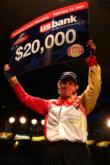 “My first tournament I got a check, and I was so thrilled. It was in my bones, and you couldn’t stop me.”
“My first tournament I got a check, and I was so thrilled. It was in my bones, and you couldn’t stop me.”
Indeed, Israel seems to have a knack for it, as her late-breaking introduction to the sport makes her many accomplishments all the more impressive. Since 1997, Israel has scored 11 top-10 finishes on three FLW Outdoors tournament trails, including four top-10s on the FLW Tour. She was eighth in 2005 co-angler points and holds the honor as the first – and, so far, only – woman ever to have won an FLW Tour event.
“I always wanted to win an FLW tournament, and of course I did that, and I’m very, very proud of being the first woman – a pioneer,” she said. “I’m so very proud of all of these accomplishments, just doing all these things and being the first woman to do this and the first woman to do that.”
 She’s also fished circles around her husband, though she admits that it is she that has the fire in her belly for bass fishing, not him, though he does enjoy it.
She’s also fished circles around her husband, though she admits that it is she that has the fire in her belly for bass fishing, not him, though he does enjoy it.
“I think my nature is a little more competitive,” she said. “Abbie was very competitive in the business, and we just changed roles. I was more laid back in the business, but afterwards, with fishing, I became the competitive person, and he did the fishing more for relaxation and enjoyment.”
With the bulk of Israel’s schooling taking place in competitive tournaments, she often had to fake knowledge of her pro’s bait when he told her about it after the pretournament meeting. She’d then run to a friend to tell her what in the world it was she was supposed to be using.
“On Tuesday nights, when I used to meet my partners, I’d be too embarrassed to tell them I’d never heard of whatever they told me they were using,” she said. “I was lucky enough to know Dan Morehead, and he would show me what it was and how to tie it on. 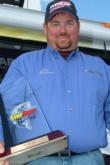 He was so nice, because on Tuesday night, he was busy with his things, but he was so nice to show me how to work all these lures in the hotel room.”
He was so nice, because on Tuesday night, he was busy with his things, but he was so nice to show me how to work all these lures in the hotel room.”
Israel also kept an eagle eye on her pro partner, reeling fast when he’d reel fast or slowing it down if that’s what she observed him doing. Eventually, all the watching paid off, and Israel became a bona fide heavy hitter in her own right. Nevertheless, it was on a technique she abhorred that she won her historic FLW Tour title.
“I won it doing a technique that was my weakest – pitching and flipping,” she said. “I prefished that tournament very, very hard. I threw crankbaits, worms, everything, and I couldn’t catch a fish in practice. I decided the only thing left for me to try was flipping. I took my tube out, started flipping and started catching fish. I was like, `Oh my God, this is the first time this has happened to me. Judy’s flipping and catching fish.'”
That tournament, she changed her tactics and flipped no matter what her pro partner was doing. She walked away $20,000 richer and with her name in the record books.
While Divincenti named a woman’s patience, Israel said if women have any advantage at all, it’s a higher sensitivity in the hands that could enable them to feel a fish bite a little faster. But other than that, she believes that man and woman are equal when it comes to throwing a line in the water, and as such, she expects to be treated no differently than a pro partner would treat a man.
“Sometimes the guys are even too nice,” she said. “I tell them, `You just go fishing, and don’t worry about me.’ Even when they try to carry my rods to the boat, I say, `No. I’ve got to do it myself.’ (The men) are just wonderful. I don’t think there are any problems at all.”
Though Judy was a grandmother by the time her fishing career started, with children grown and out of the house, she still said time apart was the overriding flaw in a career such as hers.
“I know it’s very hard for a man, but if you have family, it’s a very hard and lonely life,” she said. “That’s where I feel the biggest challenge is – being away from your family and doing 1,500-mile trips by yourself.”
Earlier in their career, the Israels’ son Eric also fished the tour, and until 2004, he continued to fish a limited schedule of events with his parents. In 1999, Eric and Judy became the first mother-son duo to claim top-10 finishes at the same event.
All three Israels choose to compete from the back of the boat as co-anglers, though Judy does take her Land O’Lakes-wrapped Ranger to every event for a serious round of prefishing. Despite her success, Israel says she still prefers the co-angler side of competition, though her skills would likely fare well on the pro side.
“I have more fun being in the back of the boat than I do the front, and my hat goes off to all these great anglers who fish the front of the boat,” she said. “I find myself with so much nerves and pressure when I fish the front of the boat, and I don’t like it. I might change, but right now, that’s where my fun is. I love learning more things, and when you’re fishing the front of the boat, you’re not learning. I would do more from the front of the boat, I know that, but I always want to love to fish, and I don’t want it to become pressure.”
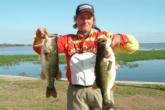 Both Divincenti and Israel claim their primary sponsors make no special requirements of them because of their gender, a fact they both appreciate. Israel, for one, says being on team Land O’Lakes has increased her confidence to the point that she is a better competitor because of it. Better results mean heightened exposure, and the more often her name is heard or read, the more likely it is she’ll inspire the next generation of women to take a chance on competitive bass fishing.
Both Divincenti and Israel claim their primary sponsors make no special requirements of them because of their gender, a fact they both appreciate. Israel, for one, says being on team Land O’Lakes has increased her confidence to the point that she is a better competitor because of it. Better results mean heightened exposure, and the more often her name is heard or read, the more likely it is she’ll inspire the next generation of women to take a chance on competitive bass fishing.
“I think we’re doing great as a whole, with the amount of women we have and the top-10s we make,” she said. “I think we’re accomplishing it. If women got involved as youngsters, I think they could really achieve. That’s the goal – to have women started at earlier ages and start fishing as kids.”
In 10 years, when today’s 7- and 8-year-old girls decide they want to try their hand at competitive fishing, they’ll have a decade of experience behind them that Israel says is key. Like Divincenti, Israel no doubt wishes her bass-angling experience had started as a child. But by the time the next generation begins to cross the weigh-in stage, the scenery will likely be a lot different, if history is any indication, and more and more women will be competing with and against the men for the ever-increasing purses and prizes in competitive bass fishing.
“We’re equal in every sense,” Israel said. “We earn the same dollars in the same divisions and everything. I love being able to compete against the guys and girls. I have so much passion and love for this sport, and tournament fishing to me is fabulous.”
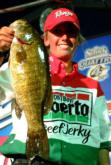 Kim Bain: “You do what you can to make it happen”
Kim Bain: “You do what you can to make it happen”
Co-angler Kim Bain has quite a pedigree. Her Australian lineage includes parents with lists of on-the-water accomplishments and tournament success to boot.
“My mum and dad are both very accomplished anglers, so my passion for the sport definitely comes from them,” she said. “My dad has had an active involvement with the fishing industry since his early teens, working as a deckhand, guide, fishing-tackle research-and-development consultant, boat designer and lure importer/distributor. He founded the bass-fishing tournament circuit in Australia.”
 Like her family, Bain is not limited to bass alone. Her achievements in FLW Outdoors tournament trails span walleye and redfish realms, too, mirroring her mother, whose personal-best catch is an 800-pound-plus tiger shark.
Like her family, Bain is not limited to bass alone. Her achievements in FLW Outdoors tournament trails span walleye and redfish realms, too, mirroring her mother, whose personal-best catch is an 800-pound-plus tiger shark.
Of all the women currently competing on the FLW Tour, it would be tough to find one with a resume as unique as Bain’s. Her present workload – owning a tackle company, taking pictures and writing articles for outdoor magazines, developing product and working with outdoors television programs, not to mention tournament fishing – is head-spinning, but it’s old hat to her. An avid hunter as well, Bain’s first article was published at the tender age of 14.
“From there, I branched out as a freelance writer and photographer, getting my work published in Australia, the U.S., Canada, Asia and Africa,” she said. “My writing then led to some TV opportunities, and I’ve worked in national fishing TV since graduating from high school as my state’s student of merit in the speech and drama excellence program. It’s been an interesting and exciting road!”
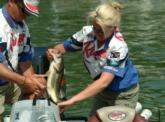 No doubt. As a woman, and a young one at that, Bain says she has avoided most of the stereotypes regarding females in bass fishing and instead has enjoyed almost total acceptance by her male counterparts. That probably stems from the fact that her mother was a professional as well, carting her young daughter to the water in a backpack when she was just a baby. She entered her first bass tournament at age 16 and came to the United States to research the tournament culture at 19.
No doubt. As a woman, and a young one at that, Bain says she has avoided most of the stereotypes regarding females in bass fishing and instead has enjoyed almost total acceptance by her male counterparts. That probably stems from the fact that her mother was a professional as well, carting her young daughter to the water in a backpack when she was just a baby. She entered her first bass tournament at age 16 and came to the United States to research the tournament culture at 19.
“I’ve always found everyone very supportive,” she said. “I have always worked hard, fished hard and tried to learn as much as I can so that I could earn (my fellow competitors’) respect through my results, with my fishing skills and with my etiquette.”
Most challenging for Bain, it seems, is simply relocating to a different part of the globe to pursue her career. Interestingly, the international community in bass fishing is growing at a rate equal to or higher than that of the female constituency, with a slew of competitors from Japan as well as other countries, such as Italy.
“Coming from Australia certainly adds a lot of expenses – a flight from Oz can cost up to $3,000,” she said. “Plus, our dollar is weaker in the exchange. But that aside, you have to follow your dreams. You do what you can to make it happen.”
To make it happen for herself, Bain ultimately decided to fish the FLW Tour from the back of the boat, maximizing the learning potential she could receive watching the world’s best at work. Her observations have led her to conclude that men and women are no doubt equal in the eyes of a bass.
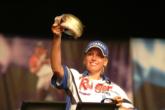 “Fishing is a sport that allows anyone to compete at a level playing field,” she said. “I don’t feel that being a female gives you any advantages or disadvantages when it comes to fishing. If you make the right cast and presentation to the right fish, it’ll eat it.”
“Fishing is a sport that allows anyone to compete at a level playing field,” she said. “I don’t feel that being a female gives you any advantages or disadvantages when it comes to fishing. If you make the right cast and presentation to the right fish, it’ll eat it.”
Also beneficial from her back-of-the-boat point of view is the ability to familiarize herself with American waters. Though Bain says making the switch to the pro side is a definite someday, she says the day you stop learning is the day you stop having fun.
“Learning from a wide variety of anglers helps you to remain diverse,” she said. “After two years on the co-angler side, I feel that I can confidently handle most tournament scenarios confidently. After my first year, I finished 99th in Angler of the Year points. On my second year, (I finished) sixth. It shows how much you can learn and improve if you keep an open mind and are ready to learn.”
Though Bain is young and is still at the beginning of her American career, she’s already earned the distinction of being the first and only woman to have qualified for a BASS end-of-season event – the 2003 BASS Open Championship. She was also the highest-placing woman in FLW Tour standings in 2005 and finished 12th at the championship.
The accomplishments and exposure – and probably her youth – have made her a role model for young women everywhere. Take, for example, a small fishing fan visiting the FLW Tour Championship in Hot Springs, Ark.
“A young girl got up extra early to come and see me blast off the final day,” Bain said. “I was sitting there really nervous about the day ahead – shooting it out for $25,000. She walked up holding her dad’s hand and said, `Girls kick butt.’ That was huge for me – it brought a tear to my eye for many reasons.”
Bain said the incident served as a gentle reminder that she’s not in it for the money – she’s here for the experience, and people are looking up to her.
In short, that could be the most unique thing women have to offer as professional anglers on the top-tier circuits. Sure, there will always be little boys who want to grow up to be the next Kevin VanDam. But thanks to women like Divincenti, Israel, Bain and the host of other women brave enough to take that chance, there are now little girls who want to grow up to be the next version of them.
“There are a lot of women competing on all tours,” Bain said. “It’s great to see and is certainly encouraging for a bright future for diverse competition.”
FLW Tour tournament director Bill Taylor agrees. “It’s a great opportunity for everybody in the sport – not just the ladies,” Taylor said. “I think the more ladies we get the better off we are, period.”
————————————————
Editor’s Note: This is the second half of a two-part feature article focusing on the state of women in professional fishing today. The first part was posted Sept. 2.